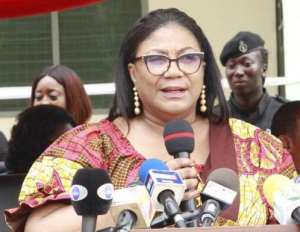
First Lady, Mrs Rebecca Akufo-Addo, in collaboration with the UNFPA, has launched the 'Because I want to Be' Project aimed at utilising community platforms to improve the reproductive and economic well-being of adolescent girls through education in Coastal Accra.
It is intended to provide social safety nets for poor and vulnerable girls to ensure uninterrupted education and provide women who had dropped out of school with skills training.
The Project is an initiative born out of a research commissioned by the Office of the First Lady.
The research studied a situation analysis and needs assessment in nine communities in the coastal districts of the Greater Accra Region to guide programme planning and improvement of girls' education.
James Town, Bukom, Chorkor, Bortianor, Doryumu, Adakope, Akplabanya, Teshie and La were selected for the research.
Specific objectives were to examine the reasons for school dropout and factors that contribute to school retention among adolescent girls, as well as examine the situation of girls' re-entry into school after pregnancy.
It also assessed the knowledge and use of sexual reproductive health services and the possible livelihood skills for student mothers with no desire to go back to school.
The study reviewed international and national level frameworks, policies and strategies.
Six international strategies were reviewed in the report, which include the UNFPA Strategic Plan (2018-2021).
The research found that poverty, teenage pregnancy, lack of educational facilities in schools and some cultural practices that motivated girls to give birth rather than concentrate on school were some of the reasons girls dropped out of school.
There was also low knowledge and use of reproductive health care services and facilities particularly contraceptives.
This was attributed to the unavailability of such services and community attitudes towards adolescent reproductive health.
It also emerged that the girls were more interested in pregnancy preventive family planning methods and gave minimum considerations to the spread of STIs.
Some teenage mothers were desirous of returning to school but were inhibited by lack of material support and absence of day care facilities for their babies.
It revealed that all the nine communities studied did not have vocational/training centres to train the girls in entrepreneurial and financial literacy skills.
There were also no designed programmes for adolescent sexuality reproductive health (ASRH) education in the selected communities.
The study, therefore, recommended the strengthening of the activities of the girl clubs in the various schools to actively include ASRH education and recruitment of peer ambassadors to ensure the effective ASRH education.
It recommended that similar activities must be carried out for boys in the schools for optimum success.
It said sponsorship must be provided for girls in school through fees, school supplies, feeding, peer-peer mentorship, and forming girl-achievers' associations or networks through workshops and girls' camps.
This, the report said, would help them build resistance against the poor socio-cultural environment.
It called for the support of families through the expansion of the Livelihood Empowerment Against Poverty and the National Health Insurance Scheme, particularly for parents of teenage mothers to provide care for the children as the girls return to school.
The study recommended the establishment of multi-purpose vocational training centres in the communities and the enrolment and sponsorship for girls in privately owned enterprises learning dressmaking or hairdressing, among other vocations.
Source: GNA




 SSNIT must be managed without gov’t interference – Austin Gamey
SSNIT must be managed without gov’t interference – Austin Gamey
 Ejisu by-election could go either way between NPP and independent candidate — Gl...
Ejisu by-election could go either way between NPP and independent candidate — Gl...
 We never asked ministers, DCEs to bring NPP apparatchiks for returning officer r...
We never asked ministers, DCEs to bring NPP apparatchiks for returning officer r...
 No one denigrated the commission when you appointed NDC sympathizers during your...
No one denigrated the commission when you appointed NDC sympathizers during your...
 Used cloth dealers protests over delayed Kumasi Central Market project
Used cloth dealers protests over delayed Kumasi Central Market project
 A/R: Kwadaso onion market traders refuse to relocate to new site
A/R: Kwadaso onion market traders refuse to relocate to new site
 Dumsor: Corn mill operators at Kaneshie market face financial crisis
Dumsor: Corn mill operators at Kaneshie market face financial crisis
 Jamestown fishermen seek support over destruction of canoes by Tuesday's heavy d...
Jamestown fishermen seek support over destruction of canoes by Tuesday's heavy d...
 Election 2024: EC to commence voter registration exercise on May 7
Election 2024: EC to commence voter registration exercise on May 7
 Public schools rebranding: We’re switching to blue and white, we’re painting all...
Public schools rebranding: We’re switching to blue and white, we’re painting all...
